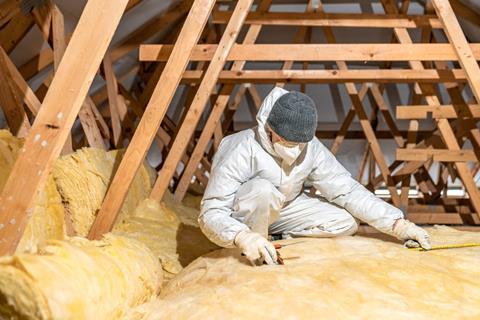National Audit Office survey uncovers litany of failures on two energy efficiency schemes including widespread suspected fraud
Almost all homes fitted with external insulation under two government retrofit schemes need remediation work to correct “major issues” including damp and mould, a report has found.
A survey by the National Audit Office (NAO) said 98% of homes given external wall insulation under the Energy Company Obligation (ECO) 4 and Great British Insulation Scheme (GBIS) will require repair work, affecting up to 23,000 homes.

Up to 13,000 homes fitted with internal insulation through the two schemes, 29% of the total, are also thought to contain major issues which need fixing, with a small percentage of problems with both internal and external insulation posing “immediate” health and safety risks.
The NAO’s report also uncovered evidence of widespread suspected fraud, with energy regulator Ofgem estimating businesses had falsified claims for installations in up to 16,500 homes.
The report focuses on work carried out between 2022 and 2025 through ECO 4 and GBIS, two schemes aiming to deliver a combined £280m in annual energy bills savings for households. ECO 4 was launched by the Johnson government while GBIS opened under Rishi Sunak.
Possible explanations for why so many installations have been carried out to such a poor standard include an under-skilled workforce, with work being subcontracted to individuals and firms who are not competent or certified, the report said.
Uncertainty over which standards apply to which homes and businesses “cutting corners” may have also contributed to the issues, according to the NAO, which found just 1% of external wall jobs met the required PAS 2035 standard.
Remediation works are said to cost between £250 and £18,000 per home “if it is done before damage occurs”, although repair work in one home fitted with internal insulation which resulted in damp, mould and dry rot cost £250,000.
TrustMark, the quality assurance scheme appointed by the government to oversee the two schemes, said 27 of the 194 registered businesses with outstanding work were no longer registered and warned there was a risk of some businesses being closed and reopened to avoid their liabilities.
Meanwhile, the level of fraud is thought to be higher than in other government retrofit schemes, with up to £165m, 3.9% of the delivery cost of the ECO 4 scheme, suspected to have been claimed fraudulently.
In comparison, the estimated levels of annual fraud and error on two other retrofit schemes, the Renewable Heat Incentive and the Boiler Upgrade Scheme, was 1% and 2% respectively in 2024-25.
While the ECO 4 and GBIS schemes attempted to reduce fraud risk by separating the retrofit assessor and coordinator roles, the NAO found that in practice the two roles are often contracted and paid by the installer, and sometimes employed by the same business.
The watchdog was also told there are suspicions that some installers were claiming payment for installations in homes and for households that are not eligible, and that installations “can be used as part of wider criminal activity”.
The Department for Energy Security and Net Zero (DESNZ) is said to be planning to apply lessons learned from the two schemes in the design of future schemes including the forthcoming Warm Homes Plan.
Gareth Davies, head of the NAO, said: “ECO and other such schemes are important to help reduce fuel poverty and meet the government’s ambitions for energy efficiency.
“But clear failures in the design and set-up of ECO and in the consumer protection system have led to poor-quality installations, as well as suspected fraud.
“DESNZ must now ensure that businesses meet their obligations to repair all affected homes as quickly as possible. It must also reform the system so that this cannot happen again.”
The NAO has outlined a series of recommendations for the department, including taking full responsibility for schemes such as ECO 4, clarifying its approach to repairing faulty installations, reforming the consumer protections system and reporting annually on levels of fraud and non-compliance.
















No comments yet